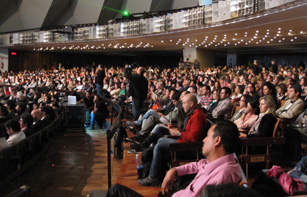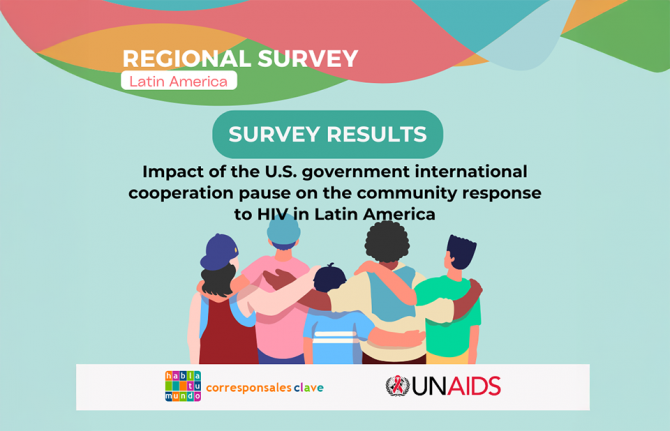
Feature Story
Regional forum highlights achievements and gaps in HIV responses across Latin America
31 August 2012
31 August 2012 31 August 2012
Panelists in the opening ceremony of the 6th Latin American and Caribbean Forum on HIV/AIDS and Sexually Transmitted Infections, including Dr Luiz Loures of UNAIDS (pictured second from right). Credit: UNAIDS
More than 4000 delegates—including government officials, health experts, community leaders, scientists, indigenous populations, youth and people living with HIV—convened from 28-31 August in Sao Paulo, Brazil, for the 6th Latin American and Caribbean Forum on HIV/AIDS and Sexually Transmitted Infections (STIs).
Hosted by the Government of Brazil in collaboration with the Horizontal Technical Cooperation Group, PAHO, UNAIDS, UNDP, UNESCO, UNICEF and civil society regional networks, the forum provided an opportunity to take stock of progress, challenges and lessons learned in HIV responses across the region. Participants engaged on a range of issues, from AIDS financing and new HIV prevention technologies to strategies for closing treatment access gaps.
Brazil widens treatment access
As delegates gathered in Sao Paulo, Brazil’s Ministry of Health announced that it will expand its national AIDS treatment programme to include at least 35 000 more people. Brazil currently provides free antiretroviral treatment to 223 000 people living with HIV—a coverage of 69%—according to government estimates.
AIDS is no longer seen as a major problem, especially in Latin America, where we have high treatment coverage. But the data are misleading because treatment is expensive. Several countries still have enormous difficulties in ensuring access for everyone.
Violeta Ross, Co-founder and Chair of the Bolivian Network of People with HIV and AIDS
Prior to this week’s announcement, Brazilians with a CD4 count of 350 cells per cubic millimeter were eligible for antiretroviral treatment. Under Brazil’s new policy, treatment eligibility will start at an earlier stage of HIV infection—at a CD4 count of 500. In a statement issued on 28 August, Brazil’s Minister of Health, Alexandre Padilha, explained that this decision was based on recent studies that have shown improvement in the quality of life of people living with HIV and a reduction of adverse effects in the immediate and long term.
“Brazil’s AIDS programme sets an example not only for Latin America, but for the world,” said Dr Luiz Loures, Director of the UNAIDS Political and Public Affairs branch and a participant in the opening ceremony of the forum. He noted that Brazil’s decision to provide earlier treatment for people living with HIV may trigger a “snowball effect” and influence health policies in other countries around the world.
Progress and gaps
Many other countries in Latin America have scaled up access to HIV treatment in recent years. According to the latest data from UNAIDS, an estimated 70% of people eligible for antiretroviral treatment in the region were receiving it at the end of 2011. Wide access to treatment has helped reduce the annual number of AIDS-related deaths: from 63 000 a decade ago to 57 000 in 2011.
Despite progress, key populations across the region, particularly men who have sex with men (MSM) and transgender people, continue to be disproportionately impacted by the epidemic and have limited access to HIV prevention and treatment services—a message that resonated throughout the forum in Sao Paulo.
An estimated half of all HIV infections in Latin America result from unprotected sex between men. According to national estimates, the reported HIV prevalence among transgender people in Argentina (34%) and Peru (20.8%) stands in sharp contrast to that of the general population: 0.4% and 0.23% in these two countries, respectively.
“AIDS is no longer seen as a major problem, especially in Latin America, where we have high treatment coverage,” noted Violeta Ross, Co-founder and Chair of the Bolivian Network of People with HIV and AIDS, in an article posted on the Brazilian Ministry of Health web site. “But the data are misleading because treatment is expensive. Several countries still have enormous difficulties in ensuring access for everyone," she added.
Voices of civil society

More than 4000 delegates convened at the forum in Sao Paulo from 28-31 August. Credit: UNAIDS
Advocates at the forum emphasized the importance of community mobilization in accelerating HIV responses among vulnerable populations. “Evidence-based strategies presented at the forum show that strengthening community work—including among sexual minorities—can transform national HIV responses,” said Simon Cazal, Executive Director of Somosgay, an organization that works to promote the human rights of lesbian, gay, bisexual, transgender and inter-sex (LGBTI) people. “The LGBTI movement has set priorities, giving rise to stronger activism. We have shown that with few resources, we can accomplish a lot if we are strategic and if we work alongside communities.”
Many delegates underscored the need to bridge the AIDS response with other social movements. "We have to evolve. We cannot just fight for more condoms and medicines,” said activist Enrique Chaves, Director of Advocacy for the non-profit organization AID for AIDS International. “We must acknowledge that the struggle for access to health and HIV services is also a matter of access to employment, housing and education. We have to connect our agenda with the broader agenda of development, the struggle for social justice,” he added.



